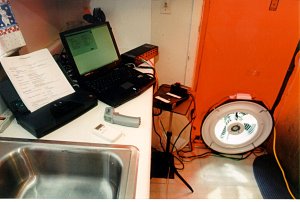 Blower door equipment is used to measure a home's
Blower door equipment is used to measure a home's
air leaks. A blower door test is part of the evaluation for
determining a home's HERS Index.
Photo by: D&R International
Remember the day when most men knew the horsepower of their muscle cars? Now most of us are concerned about miles per gallon. But what can we use to bring prestige to our houses? It used to be that a large square footage gave us bragging rights. But if all goes according to the plan of the Residential Energy Services Network (RESNET), the talk around the water cooler will be "What's your house's HERS score?"
Home energy ratings have been around since 1981. The idea began in the mortgage industry to credit the energy efficiency of homes towards the home mortgage. An energy efficient home means that the homeowner is spending less each month on electricity and natural gas and therefore has more to spend on the mortgage. RESNET has been developing the Home Energy Rating System (HERS) since 1981. In the beginning, it was the higher the HERS score the better. But because of the more widespread introduction of renewable energy systems, such as photovoltaics (PV) and solar hot water systems, into homes, and the ability of many houses today to produce as much electricity and/or hot water as they need over the course of a year-these are called net zero-energy houses-a HERS Index of "0" is the goal. A HERS score of 85 means that a new home meets Energy Star standards. A HERS score of 150 means you're living with an Energy Hog. The typical existing home in the United States has a HERS Index of 130.
HERS raters look at a home's heating and cooling efficiency, insulation levels, appliance and lighting energy use, window efficiency, a home's solar orientation, and other factors that are tailored to the home's climate region, and use computer software to calculate a HERS index.
Some readers my be asking, "Why should I care?" You should care because the HERS score is becoming the standard du jour for homebuilders. If you want a bigger, energy efficiency mortgage, you'll need a HERS rater to measure the efficiency of the home you want to buy and to tell you what retrofits you need to do to qualify. If you are a builder and want to catch the "green wave" by earning an Energy Star rating for the new homes you are selling, you've got to get those homes rated by a certified HERS rater.
